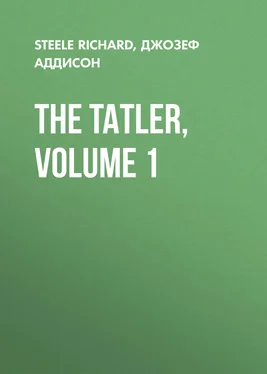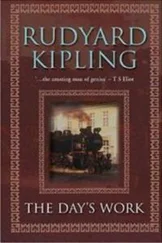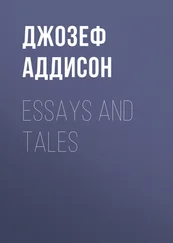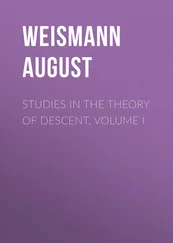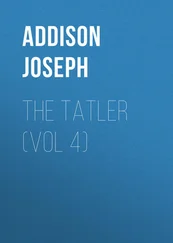Джозеф Аддисон - The Tatler, Volume 1
Здесь есть возможность читать онлайн «Джозеф Аддисон - The Tatler, Volume 1» — ознакомительный отрывок электронной книги совершенно бесплатно, а после прочтения отрывка купить полную версию. В некоторых случаях можно слушать аудио, скачать через торрент в формате fb2 и присутствует краткое содержание. Жанр: foreign_prose, foreign_antique, на английском языке. Описание произведения, (предисловие) а так же отзывы посетителей доступны на портале библиотеки ЛибКат.
- Название:The Tatler, Volume 1
- Автор:
- Жанр:
- Год:неизвестен
- ISBN:нет данных
- Рейтинг книги:4 / 5. Голосов: 1
-
Избранное:Добавить в избранное
- Отзывы:
-
Ваша оценка:
- 80
- 1
- 2
- 3
- 4
- 5
The Tatler, Volume 1: краткое содержание, описание и аннотация
Предлагаем к чтению аннотацию, описание, краткое содержание или предисловие (зависит от того, что написал сам автор книги «The Tatler, Volume 1»). Если вы не нашли необходимую информацию о книге — напишите в комментариях, мы постараемся отыскать её.
The Tatler, Volume 1 — читать онлайн ознакомительный отрывок
Ниже представлен текст книги, разбитый по страницам. Система сохранения места последней прочитанной страницы, позволяет с удобством читать онлайн бесплатно книгу «The Tatler, Volume 1», без необходимости каждый раз заново искать на чём Вы остановились. Поставьте закладку, и сможете в любой момент перейти на страницу, на которой закончили чтение.
Интервал:
Закладка:
White's Chocolate-house, April 18
All hearts at present pant for two ladies only 96 96 In a copy of the original edition of the Tatler , with MS. notes written early in the last century, which was sold at Messrs. Sotheby's, in April, 1887, the ladies here described were said to be Mrs. Chetwine and Mrs. Hales respectively. Mrs. Hales was a maid of honour who married Mr. Coke, vice-chamberlain, in July, 1709 (Luttrell's "Brief Relation," vi. 462); "Mrs. Chetwine" was probably the wife of William Richard Chetwynd, afterwards third Viscount Chetwynd, who married Honora, daughter of John Baker, Consul at Algiers; or the wife of his brother Walter, M.P. for Stafford, and Master of the Buckhounds. In 1717, Lady M. W. Montagu, describing a week spent by a fashionable lady, said, 'Friday, Mrs. Chetwynd's, &c.; a perpetual round of hearing the same scandal' (Pope's Works, ix. 385).
, who have for some time engrossed the dominion of the town. They are indeed both exceeding charming, but differ very much in their excellences. The beauty of Clarissa is soft, that of Chloe piercing. When you look at Clarissa, you see the most exact harmony of feature, complexion, and shape; you find in Chloe nothing extraordinary in any one of those particulars, but the whole woman irresistible. Clarissa looks languishing; Chloe, killing. Clarissa never fails of gaining admiration; Chloe, of moving desire. The gazers at Clarissa are at first unconcerned, as if they were observing a fine picture. They who behold Chloe, at the first glance, discover transport, as if they met their dearest friend. These different perfections are suitably represented by the last great painter Italy has sent us, Mr. Jervas. 97 97 Charles Jervas, portrait painter (died 1739), became principal painter to George I. and George II. He also made a translation of "Don Quixote," first published in 1742.
Clarissa is, by that skilful hand, placed in a manner that looks artless, and innocent of the torments she gives; Chloe drawn with a liveliness that shows she is conscious, but not affected, of her perfections. Clarissa is a shepherdess; Chloe, a country girl. I must own, the design of Chloe's picture shows, to me, great mastery in the painter; for nothing could be better imagined than the dress he has given her, of a straw hat and riband, to represent that sort of beauty which enters the heart with a certain familiarity, and cheats it into a belief, that it has received a lover as well as an object of love. The force of their different beauties is seen also in the effects it makes on their lovers. The admirers of Chloe are eternally gay and well-pleased: those of Clarissa, melancholy and thoughtful. And as this passion always changes the natural man into a quite different creature from what he was before, the love of Chloe makes coxcombs; that of Clarissa, madmen. There were of each kind just now here. Here was one that whistles, laughs, sings, and cuts capers, for love of Chloe. Another has just now written three lines to Clarissa, then taken a turn in the garden, then came back again, then tore his fragment, then called for some chocolate, then went away without it.
Chloe has so many admirers in the room at present, that there is too much noise to proceed in my narration, so that the progress of the loves of Clarissa and Chloe, together with the bottles that are drank each night for the one, and the many sighs which are uttered, and songs written, on the other, must be our subject on future occasions.
Will's Coffee-house, April 18
Letters from the Haymarket inform us, that on Saturday night last the opera of "Pyrrhus and Demetrius" 98 98 A translation of Owen McSwiney (1709) from the Italian of Scarlatti.
was performed with great applause. This intelligence is not very acceptable to us friends of the theatre; for the stage being an entertainment of the reason and all our faculties, this way of being pleased with the suspense of them for three hours together, and being given up to the shallow satisfaction of the eyes and ears only, seems to arise rather from the degeneracy of our understanding, than an improvement of our diversions. 99 99 In the Spectator (Nos. 1, 5, 13, &c.) Addison often wrote against the Italian opera. In 1706, Dennis published "An Essay on the Operas after the Italian Manner, which are about to be established on the English Stage: with some reflections on the damage which they may bring to the Public." He traces to the recent alterations in the entertainments of the stage, the fact that familiar conversation among all classes was confined to two points, news and toasting, neither of which required much intelligence.
That the understanding has no part in the pleasure is evident, from what these letters very positively assert, to wit, that a great part of the performance was done in Italian: and a great critic fell into fits in the gallery, at feeling, not only time and place, but languages and nations confused in the most incorrigible manner. His spleen is so extremely moved on this occasion, that he is going to publish a treatise against operas, which, he thinks, have already inclined us to thoughts of peace, and if tolerated, must infallibly dispirit us from carrying on the war. He has communicated his scheme to the whole room, and declared in what manner things of this kind were first introduced. He has upon this occasion considered the nature of sounds in general, and made a very elaborate digression upon the London cries, 100 100 The street cries of 1709 are described in Lauron's "Habits and Cries of the City of London." They included "Any card-matches or save-alls" and "Twelve-pence a peck, oysters."
wherein he has shown from reason and philosophy why oysters are cried, card-matches 101 101 Matches made by dipping pieces of card in melted sulphur. In the Spectator (No. 251), Addison speaks of vendors of card-matches as examples of the fact that those made most noise who had least to sell.
sung, and turnips and all other vegetables neither cried, sung, nor said, but sold, with an accent and tone neither natural to man or beast. This piece seems to be taken from the model of that excellent discourse of Mrs. Manly the schoolmistress, concerning samplers. 102 102 In vol. ii. of Dr. W. King's Works (1776) is "An Essay on the Invention of Samplers, by Mrs. Arabella Manly, schoolmistress at Hackney."
Advices from the upper end of Piccadilly say that Mayfair is utterly abolished; 103 103 May Fair was abolished in 1709, after it had on several occasions been presented as a nuisance by the Grand Jury at Westminster. This fair was granted by King James II. under the Great Seal, in the fourth year of his reign, to Sir John Coell and his heirs for ever, in trust for Henry Lord Dover and his heirs for ever, to be held in the field called Brookfield, in the parish of St. Martin's, Westminster, to commence on the first day of May, and to continue fifteen days yearly. It soon became the resort of the idle, the dissipated, and the profligate, insomuch that the peace-officers were frequently opposed in the performance of their duty; and, in the year 1702, John Cooper, one of the constables, was killed, for which a fencing-master, named Cook, was executed. (See also No. 20 .) The fair was revived under George I., but was finally abolished through the exertions of the sixth Earl of Coventry.
and we hear Mr. Pinkethman 104 104 William Pinkethman, the popular actor and droll, was spoken of by Gildon as "the flower of Bartholomew Fair, and the idol of the rabble." In June, 1710, he opened a theatre at Greenwich, and in 1711 his "wonderful invention called The Pantheon, or, The Temple of the Heathen Gods," with over 100 figures, was to be seen in the Little Piazza, Covent Garden ( Spectator , No. 46, advertisement).
has removed his ingenious company of strollers to Greenwich: but other letters from Deptford say, the company is only making thither, and not yet settled; but that several heathen gods and goddesses, which are to descend in machines, landed at the King's Head Stairs last Saturday. Venus and Cupid went on foot from thence to Greenwich; Mars got drunk in the town, and broke his landlord's head; for which he sat in the stocks the whole evening; but Mr. Pinkethman giving security that he should do nothing this ensuing summer, he was set at liberty. The most melancholy part of all, was, that Diana was taken in the act of fornication with a boatman, and committed by Justice Wrathful, which has, it seems, put a stop to the diversions of the theatre of Blackheath. But there goes down another Diana and a patient Grissel next tide from Billingsgate. 105 105 "It is credibly reported that Mr. D–y has agreed with Mr. Pinkethman to have his play acted before that audience as soon as it has had its first sixteen days' run in Drury Lane" (folio). The play was D'Urfey's "Modern Prophets."
Интервал:
Закладка:
Похожие книги на «The Tatler, Volume 1»
Представляем Вашему вниманию похожие книги на «The Tatler, Volume 1» списком для выбора. Мы отобрали схожую по названию и смыслу литературу в надежде предоставить читателям больше вариантов отыскать новые, интересные, ещё непрочитанные произведения.
Обсуждение, отзывы о книге «The Tatler, Volume 1» и просто собственные мнения читателей. Оставьте ваши комментарии, напишите, что Вы думаете о произведении, его смысле или главных героях. Укажите что конкретно понравилось, а что нет, и почему Вы так считаете.
